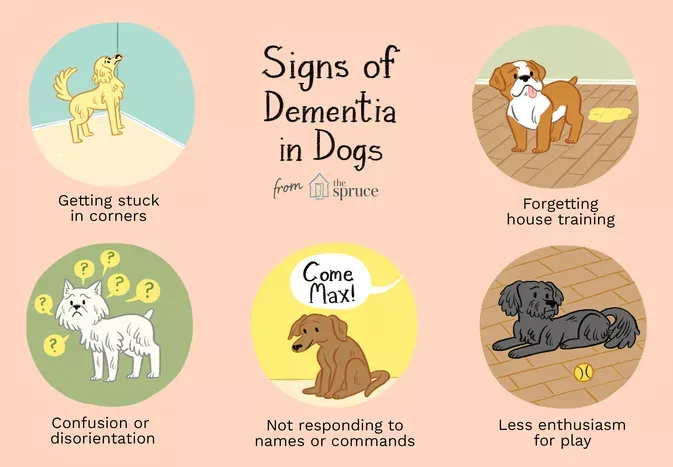Dementia and Senility in Dogs
Updated on 05/27/24

Dementia and Senility in Dogs: A Comprehensive Guide for Concerned Pet Owners
As our beloved canine companions age, it's important to be aware of the challenges that may arise with their cognitive function. Dementia and senility, while not synonymous, are common conditions in senior dogs that can significantly impact their daily lives and your relationship with them.
What is Dementia?
Dementia is a progressive, irreversible decline in cognitive function that affects memory, learning, and reasoning abilities. It's caused by changes in the brain, such as the accumulation of beta-amyloid plaques and neurofibrillary tangles. These changes disrupt the communication between neurons, leading to the characteristic symptoms of dementia.
Signs and Symptoms of Dementia
* Memory loss: Dogs with dementia may become forgetful, losing track of familiar people, places, and routines.
* Disorientation: They may become confused about their surroundings or get lost in familiar areas.
* Difficulty learning: Dogs with dementia may have trouble picking up new tasks or remembering commands they once knew.
* Changes in behavior: They may exhibit restlessness, pacing, or excessive barking. Sleep-wake cycles may also become disrupted.
* House soiling: Dogs with dementia may forget their housetraining and start urinating or defecating in inappropriate places.
What is Senility?
Senility is a term often used to describe the natural aging process in dogs. It encompasses a wide range of physical and cognitive changes that occur as a dog enters its golden years. These changes can include:
* Decreased mobility: Joint pain and stiffness can make it difficult for senior dogs to move around.
* Sensory decline: Hearing and vision may diminish, leading to confusion and disorientation.
* Weakened immune system: Senior dogs are more susceptible to infections and diseases.
* Changes in appetite: Some dogs may experience a decrease in appetite, while others may develop food sensitivities.
Signs and Symptoms of Senility
* Graying muzzle and hair: This is a natural sign of aging.
* Increased sleep: Senior dogs may sleep more as their energy levels decrease.
* Reduced activity level: They may become less interested in playing and exercising.
* Weight loss: Muscle loss and decreased appetite can lead to weight loss.
* Incontinence: Senior dogs may experience occasional incontinence due to weakened bladder and bowel muscles.
Diagnosing Dementia and Senility
Diagnosing dementia and senility in dogs can be challenging, as there is no single definitive test. Veterinarians will typically consider the dog's history, physical examination, and cognitive assessment. Blood tests and imaging techniques (such as MRI or CT scans) may also be used to rule out other underlying conditions.
Treatment Options
There is no cure for dementia or senility, but there are treatments available to help manage the symptoms and improve your dog's quality of life.
* Medication: Antioxidants (e.g., vitamin E) and cholinesterase inhibitors (e.g., donepezil) may help slow the progression of cognitive decline.
* Environmental enrichment: Providing plenty of mental and physical stimulation can help keep your dog's mind active and engaged.
* Behavioral therapy: Training and positive reinforcement can help dogs with dementia cope with their cognitive challenges and maintain a sense of purpose.
* Supportive care: Ensuring your dog has a comfortable and safe home environment, nutritious food, and regular veterinary checkups is essential for their well-being.
Living with a Dog with Dementia or Senility
Living with a dog with dementia or senility can be challenging, but it's important to remember that they still deserve your love and care. Here are some tips for coping:
* Be patient: Dogs with dementia may behave in unpredictable ways. Try to understand their limitations and respond with patience and compassion.
* Establish routines: Sticking to a regular schedule for feeding, exercise, and medications can help provide structure and predictability for your dog.
* Provide safe spaces: Create designated areas in your home where your dog can feel safe and secure.
* Reduce stress: Avoid situations that may trigger your dog's confusion or anxiety.
* Seek support: Join support groups or connect with other pet owners who have experience with dementia in dogs.
Conclusion
Dementia and senility are common challenges that can arise in aging dogs. By understanding the signs and symptoms of these conditions, you can provide the best possible care for your beloved companion. While there is no cure, there are treatments and strategies that can help manage the symptoms and improve your dog's quality of life. Remember, even with cognitive decline, your dog still deserves love, comfort, and a dignified life.
Explore More Pets

Basic Training
Puppy and Baby Introductions

Working Dog Breeds
All About Search and Rescue Dogs

Dog Treatments
Puppy Vaginitis: Signs, Causes and Treatment

Dog Adoption
After More Than 1,200 Days in the Shelter, Coco Goes Home

Basic Training
How to Train Your Puppy to Go on Potty Pads

Hybrid Dog Breeds
The Difference Between a Mutt, Mixed Breed, or Designer Dog?

Dog Treatments
Nail Problems in Dogs

Puppies
7 Reasons Why Two Dogs Are Better Than One
